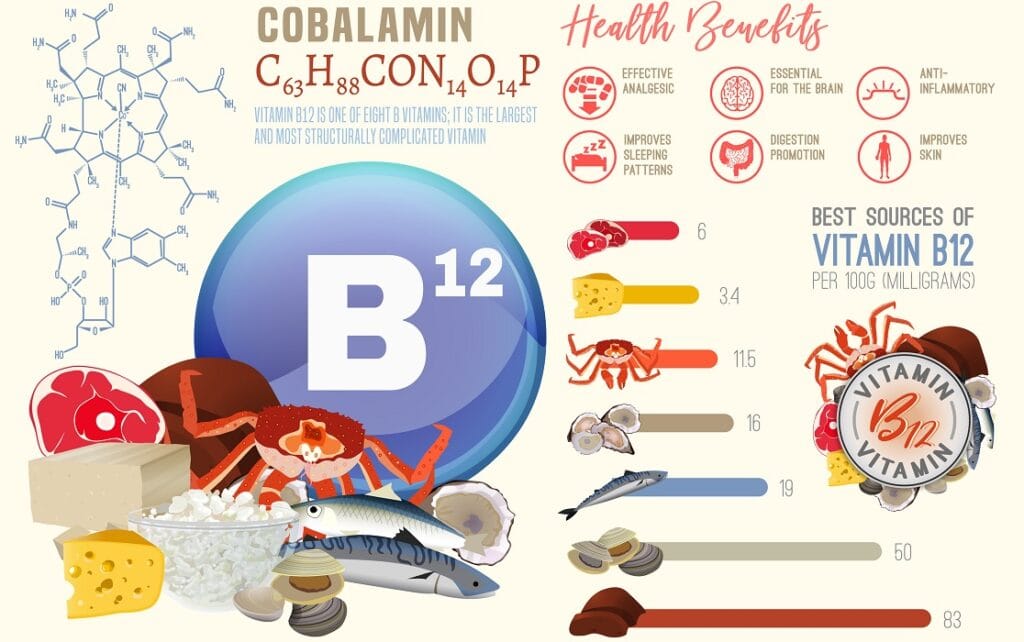In today’s fast-paced world, where our daily routines are busier than ever, taking care of our health can sometimes be overlooked. However, one thing we cannot afford to ignore is our nutrition, especially when it comes to vitamins. Among the essential nutrients, Vitamin B plays a crucial role in maintaining a healthy life. Whether you’re familiar with the term or hearing it for the first time, understanding how this group of vitamins affects your body is important for everyone.
This article will dive deep into the world of Vitamin B, particularly focusing on Vitamin B12, and why these nutrients are vital for your overall well-being.
What is Vitamin B?
Vitamin B is not a single vitamin but a group of eight different vitamins, collectively known as the Vitamin B complex. Each one has its own unique role in the body, but together, they work in harmony to keep various bodily functions running smoothly. Here is a quick overview of each B vitamin:
- Vitamin B1 (Thiamine): Helps convert food into energy and is important for nerve function.
- Vitamin B2 (Riboflavin): Plays a role in energy production and the breakdown of fats.
- Vitamin B3 (Niacin): Helps maintain healthy skin and nerves and supports digestion.
- Vitamin B5 (Pantothenic Acid): Involved in the production of hormones and cholesterol.
- Vitamin B6 (Pyridoxine): Supports brain development and helps produce the hormones serotonin and norepinephrine, which regulate mood.
- Vitamin B7 (Biotin): Essential for the health of skin, hair, and nails.
- Vitamin B9 (Folate/Folic Acid): Important for DNA synthesis and cell division, especially during pregnancy.
- Vitamin B12 (Cobalamin): Key for red blood cell formation and brain function.
These vitamins are water-soluble, meaning your body doesn’t store them. This is why it’s important to consume them regularly through your diet or supplements.
The Role of Vitamin B in the Body
The Vitamin B complex is essential for converting the food we eat into energy. It does this by helping the body break down carbohydrates, fats, and proteins. But that’s not all. Each vitamin in the group plays specific roles in the body’s health:
- Energy Production: Vitamins B1, B2, B3, B5, B6, and B7 work together to break down food and convert it into energy. This energy is what keeps our body running throughout the day.
- Brain Function and Mental Health: Vitamin B6, B9, and B12 are especially important for the brain and nervous system. They help produce neurotransmitters that regulate mood and cognitive function. Vitamin B12, in particular, supports memory and concentration.
- Red Blood Cell Formation: Vitamin B12 and B9 are crucial for producing red blood cells. These cells transport oxygen throughout the body, and without enough of these vitamins, you can develop anemia, which leads to fatigue and weakness.
- Skin, Hair, and Nails: B vitamins, particularly B7 (Biotin), are vital for healthy skin, hair, and nails. A deficiency in biotin can lead to brittle nails, thinning hair, and skin rashes.
- Digestive Health: The entire B vitamin family contributes to a healthy digestive system. Vitamin B3 helps with the breakdown of food, while B6 and B12 are necessary for the proper absorption of nutrients.
What is Vitamin B12?
Now, let’s take a closer look at one of the most well-known B vitamins: Vitamin B12. This vitamin is unique among the B complex because it contains cobalt, and that’s why it’s also called Cobalamin.
Vitamin B12 is crucial for the proper functioning of the brain and nerves, the production of red blood cells, and the creation of DNA. It’s primarily found in animal products like meat, fish, eggs, and dairy, making it harder for vegans and vegetarians to get adequate amounts through diet alone. However, there are plant-based supplements and fortified foods available to help.
Key Functions of Vitamin B12
- Red Blood Cell Formation: Vitamin B12 works with Folate (Vitamin B9) to create red blood cells. Without enough of it, red blood cells become large and irregular, leading to a condition known as megaloblastic anemia. Symptoms include weakness, fatigue, and shortness of breath.
- DNA Synthesis: This vitamin is also involved in creating and maintaining DNA. DNA is the genetic material found in every cell of your body, so proper B12 levels are essential for healthy cell division and function.
- Brain and Nervous System Health: Vitamin B12 supports the production of myelin, a protective sheath that covers nerve fibers. Myelin ensures that electrical impulses are transmitted quickly and efficiently between nerves. Deficiency in B12 can lead to neurological issues like memory loss, mood changes, and even dementia over time.
- Energy Levels: Although Vitamin B12 doesn’t provide energy itself, it plays a key role in converting the food we eat into glucose, which fuels our cells. Low levels of B12 can result in chronic fatigue and a lack of energy.
Symptoms of Vitamin B Deficiency
Because B vitamins are involved in so many vital functions, a deficiency in any of them can have a significant impact on your health. Here are some common signs and symptoms of B vitamin deficiencies:
- Fatigue and Weakness: A lack of Vitamin B12 or B9 can lead to anemia, which reduces oxygen flow to the body’s tissues, resulting in tiredness and weakness.
- Nerve Damage: A deficiency in Vitamin B12 can cause numbness or tingling in the hands and feet, muscle weakness, and difficulty walking due to nerve damage.
- Skin Problems: Low levels of Vitamin B2 or B7 may result in dry, cracked skin, rashes, or brittle hair and nails.
- Cognitive Issues: Poor concentration, memory loss, and even depression have been linked to insufficient levels of Vitamin B12.
- Digestive Issues: Deficiencies in B vitamins, especially B3, can cause digestive problems like indigestion, diarrhea, or a swollen tongue.
If you’re experiencing any of these symptoms, it’s important to talk to your doctor and get your vitamin levels checked.
How to Get Enough Vitamin B
The best way to get your daily dose of B vitamins is through a well-balanced diet. Here’s how you can ensure you’re consuming enough of these essential nutrients:
- Animal Products: If you’re a meat-eater, you’re in luck. Meat, poultry, fish, eggs, and dairy products are all rich sources of Vitamin B12, B2, B3, and B5.
- Whole Grains: Whole grains like brown rice, oats, and barley are packed with B vitamins, especially B1, B2, B3, and B6. Try to include whole grains in your meals instead of processed grains like white bread and pasta.
- Legumes: Lentils, chickpeas, and beans are rich in B vitamins, particularly B1, B3, B5, and B6. They’re a great option for vegetarians and vegans.
- Leafy Greens: Spinach, kale, and other leafy greens are excellent sources of Folate (Vitamin B9). Incorporating these vegetables into your diet helps support red blood cell production and cell division.
- Nuts and Seeds: Almonds, sunflower seeds, and flaxseeds are high in Vitamin B6 and B7 (Biotin). They also provide healthy fats and proteins.
- Fortified Foods: Many cereals, plant-based milk, and nutritional yeast are fortified with Vitamin B12 and other B vitamins, making them a great option for vegans and vegetarians.
- Supplements: If you’re not getting enough B vitamins through food, supplements can be a good option. Vitamin B12 supplements are particularly important for people on a plant-based diet, as it is difficult to obtain sufficient amounts from non-animal sources.
How Much Vitamin B Do You Need?
The recommended daily intake of B vitamins varies depending on your age, gender, and life stage. Here’s a quick guide to the daily recommendations for some key B vitamins:
- Vitamin B1 (Thiamine): 1.1-1.2 mg per day
- Vitamin B2 (Riboflavin): 1.1-1.3 mg per day
- Vitamin B3 (Niacin): 14-16 mg per day
- Vitamin B6 (Pyridoxine): 1.3-2.0 mg per day
- Vitamin B9 (Folate): 400-600 mcg per day
- Vitamin B12 (Cobalamin): 2.4 mcg per day
Pregnant and breastfeeding women may require higher amounts, especially of Vitamin B9 (Folate) and Vitamin B12, as these are vital for fetal development and milk production.
YOU MAY ALSO LIKE: Keto Food Sources of Vitamin C
Who is at Risk for Vitamin B Deficiency?
Certain groups of people are more at risk of developing a B vitamin deficiency:
- Vegans and Vegetarians: Since Vitamin B12 is primarily found in animal products, those who follow a plant-based diet need to be extra mindful of their B12 intake.
- Older Adults: As we age, our bodies become less efficient at absorbing Vitamin B12 from food, which can lead to a deficiency.
- Pregnant Women: Pregnant women require more Folate and Vitamin B12 to support the growth and development of their baby.
- People with Digestive Disorders: Conditions like Crohn’s disease or celiac disease can interfere with the absorption of B vitamins from food.
- People with Alcohol Dependency: Excessive alcohol consumption can deplete B vitamins in the body, leading to deficiencies.
Vitamins are essential for maintaining our health, and Vitamin B plays an especially important role in ensuring our body functions optimally. From producing energy to supporting brain function and promoting healthy skin, hair, and nails, the Vitamin B complex does it all. Among these, Vitamin B12 is particularly vital for red blood cell formation and nervous system health.
By eating a balanced diet rich in whole grains, leafy greens, legumes, and animal products (or fortified foods for vegetarians and vegans), you can ensure you’re getting enough of these essential nutrients. In some cases, supplements may be necessary, especially if you fall into a higher-risk category.
Remember, good nutrition is the foundation of a healthy life, and ensuring you get enough Vitamin B is a key part of that. Take care of your body, and it will take care of you.


